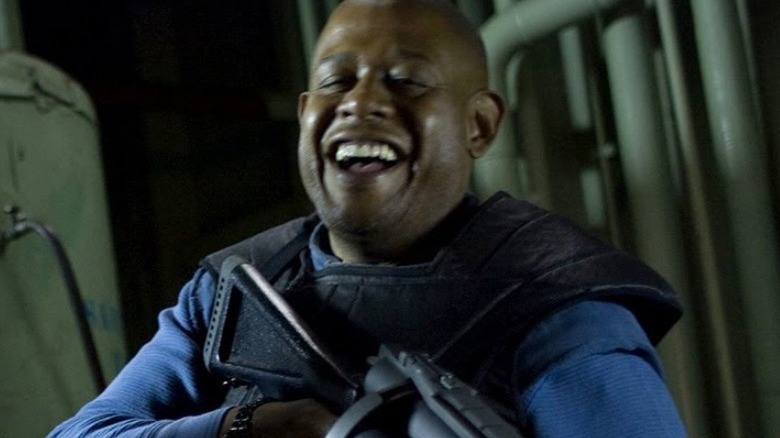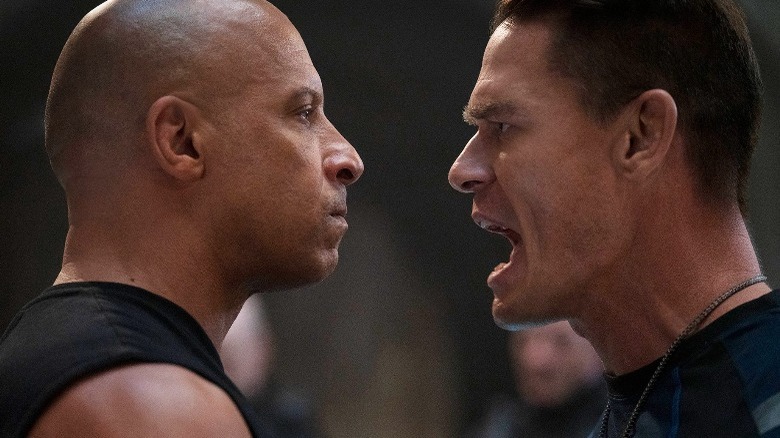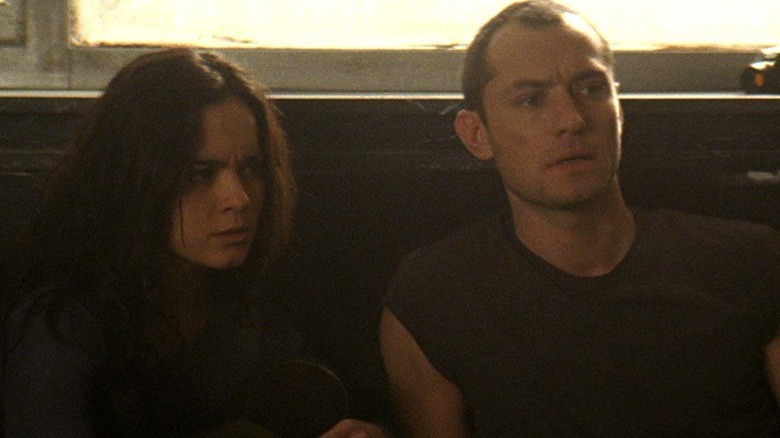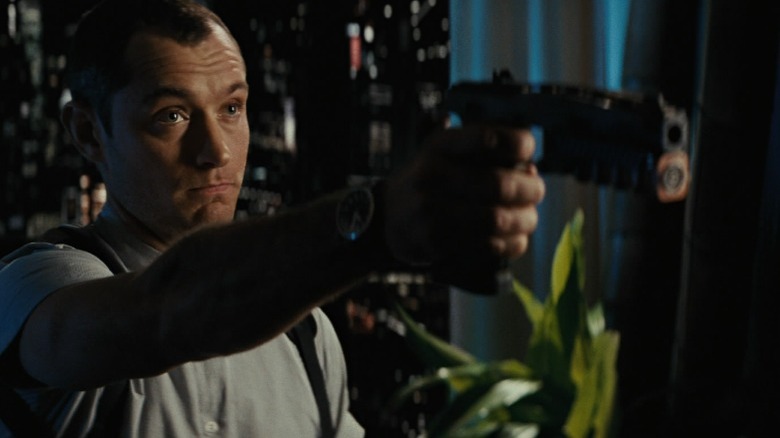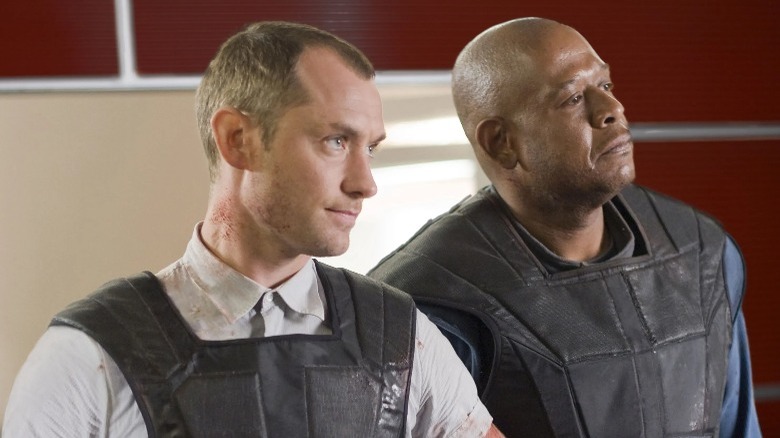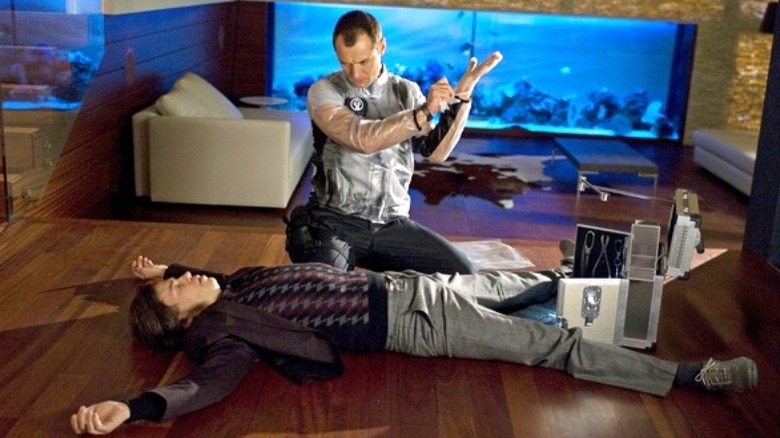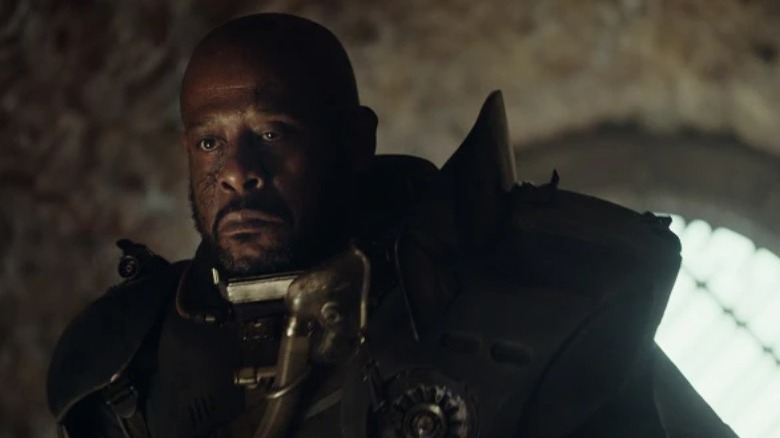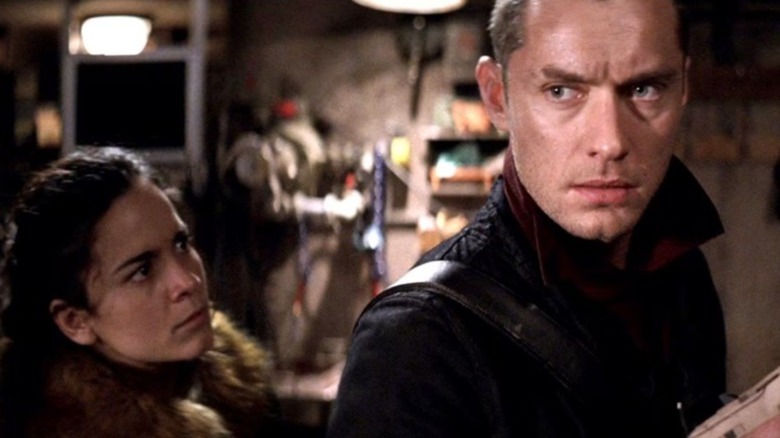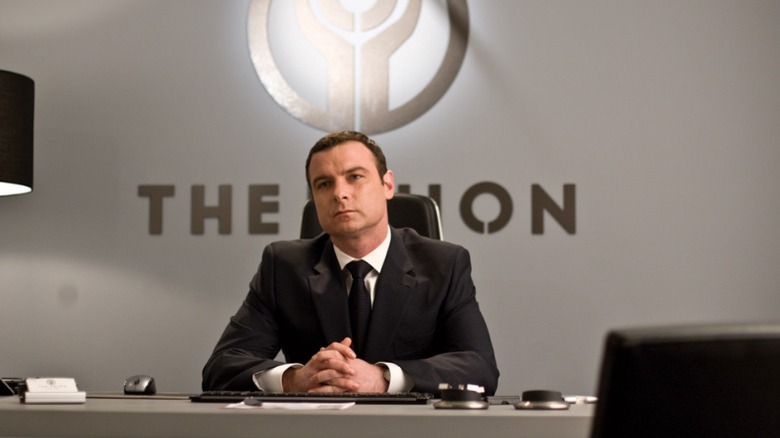The Untold Truth Of Repo Men
Just sign on the dotted line. That's all it takes to sell your soul to The Union – a futuristic corporation that has perfected artificial, mechanized organs and sells them for a king's ransom. Of course, sometimes that life-saving augmented body part is necessary. But what's a person to do that can't afford the cash outright? Buy it on credit, of course. The only catch is that if said individual misses payments for too many months, a retrieval force is dispatched to cut them open and repossess the organ they can't pay for. Doesn't this sound perfectly horrific? That's the world of "Repo Men."
The reality of private pharmaceutical corporations that withhold life-altering medications for hefty prices is already a world we're familiar with, sadly. So it's not too terribly difficult to imagine a world where greedy business tycoons capitalize off the sale of artificially-crafted organs (or artiforgs) in a market with an astronomically high demand and no suppliers. What's even more terrifying, however, is that some individuals would do the seemingly murderous work of reclaiming the organs, essentially leaving you for dead. The Union doesn't "kill" people. They simply repossess what's theirs if the buyer can't pay.
Jude Law plays the role of Remy, a repo man who gets his hands dirty for The Union. However, shocking circumstances (pun intended) flip the script, placing Remy on the other side of a repo man's stun gun and suddenly realizing the inhumanity of what he's been doing. With that said, let's dive into some of the lesser known elements of "Repo Men" and the making of the film.
Forest Whitaker studied Filipino Kali and used it in the film
Remy's greatest friend and ally becomes his worst foe. Forest Whitaker portrays Jake, Remy's partner in crime when it comes to the organ reclamation biz. Remy and Jake go way back, their bond is nearly unshakeable, and together the pair are the best repo men The Union employs. Both Remy and Jake seem to lack any sense of remorse while they're out on the job potentially ending lives. Only Remy begins to feel a sense of terror and the yoke of bondage that The Union holds over people who can't cover the financial burden of purchasing the hardware they desperately need.
While Jake feels nothing for his other victims, Remy is his closest friend. He attempts to convince Remy to come in and talk with management to work out an arrangement when he falls behind on the payments for his own artiforg, but Remy can't bring himself to do it. So Jake has to employ other talents to bring Remy in.
Whitaker's affinity for martial arts played a key role in his performance (via The Los Angeles Times). His vast talent as an actor might overshadow the little-known fact that Whitaker holds a black belt and is proficient in the art of Filipino kali. This fighting style makes use of a staff or stick, and many viewers can see how that — along with Whitaker's own physical prowess — came in handy during his close quarters combat sequences in the film.
In this sci-fi future, the Fast and the Furious franchise exists
"Repo Men" takes place in the year 2025. When the movie was released in 2010, that at least afforded society 15 years to achieve the advanced technology seen in the film's healthcare advancements, transportation systems and combat weaponry. But alas, "Repo Men" will eventually join the ever-growing catalogue of futuristic sci-fi films like "Blade Runner" or "Back to the Future" that depict dates and times that are now in our past, albeit with wildly different visions of a future that did not end up matching with reality.
However, "Repo Men" did get one thing right, sort of. Across the cityscape, there are countless billboards and screens marketing many brands that we are familiar with. One of those is an advertisement for "The Fast and the Furious X." It's good to know that in this future, Dom Toretto and the crew are still up to their ridiculous hijinks and blowing up muscle cars on the big screen. In real life, "Fast X," the series' 10th installment, is set for release in 2023, just two years before the date predicted in "Repo Men." But since the franchise's finale is expected to arrive in two parts, with the second half not currently having a release date, it's still possible that the final "Fast and Furious" movie will come out in 2025.
Young Remy is played by Jude Law's son
Remy and Jake's days as best buds go way back. The two serve in the military together, operating a tank — a job tailor-made for a pair who are chompin' at the bit to blow things sky high. The duo also cause chaos in bars and strip clubs, always having each other's backs whenever they get into fights. Remy and Jake are inseparable, and as we learn, their friendship goes even further back than the military. Remy and Jake find each other in a schoolyard and are most certainly two of the finest troublemakers of their elementary school years. Big Jake even attempts to bully little Remy, but he quickly gains a healthy respect for Remy after the feisty, scrawny kid retaliates.
If young Remy looks as close as we'll ever get to seeing Jude Law as a fourth grader, that's because the actor is none other than Jude Law's son, Raff Law. This was the young actor's first-ever appearance on screen. Since then, he's appeared in a few shorts before landing his first significant role in the upcoming TV series "Masters of the Air," which tells the story of the bombers who fought against Germany during World War II. There is currently no release date for the series, but it will presumably arrive on Apple's streaming service.
The film's most pivotal moment is both literal and metaphorical
"Repo Men" is a tale of two friends who find themselves at odds over ethics and duty. For quite some time, Remy is just as willing to overlook ethics for the sake of duty as his partner Jake. They often find it hilarious to recap their victims' reactions when the repo men make an entrance and the targets realize their demise is at hand. When the pair finds a nest — a hideout for folks with artiforgs that are past due — they make a game out of seeing who can take out the most people. "A job's a job," they tell themselves, making the slimy nature of their daily activities all the easier to swallow.
When Remy is jolted by a faulty defibrillation unit, and has to undergo an operation to receive a new heart, Jake prods him into signing the same dotted line that so many of their victims of repossession signed in order to stay alive. After undergoing the procedure, Remy finds that he can no longer do his job. It's not that he's physically incapable. He simply can't stomach cutting open another human being and harvesting their organs. Because of this, he can't pay for his own artiforg. Ironically, he has a change of heart both literally and metaphorically speaking. From a writing perspective, it isn't a coincidence that it's a new heart that he requires, symbolizing the beginning of his growth as a character.
The film is based on a novel called The Repossession Mambo
While it's not related to the 1984 cult classic "Repo Man," some might perceive "Repo Men" to be connected to "Repo! The Genetic Opera." This 2008 sci-fi horror rock opera tells a similar story of a company that provides organ transplants in a distant future where the demand is high. They also send repo men to collect organs from clients who have missed payments. Sound familiar?
You'd be mistaken for linking the two, however. The subject matter of both films is merely a coincidence. "Repo Men" is actually based on the novel "The Repossession Mambo" by Eric Garcia. The novel tells a mostly similar story to the one seen in the film, but delves even deeper into the main character's past as a repo man.
Like the film, the story is told from the perspective of the protagonist (who remains unnamed in the novel) and the book goes to great lengths to show how the work of a repo man causes the protagonist to lose his soul. Because of this, he doesn't connect well with others and has had several marriages fail because of his coldness and distance. That's one major difference from the film, which depicts Remy with a family. Of course, it's only after he must receive a new heart that he recovers a bit of humanity. The movie honors its source material when its revealed at the end of the film that Remy's own written account of what happened is entitled "The Repossession Mambo."
A Monty Python sketch about organ transplant can be seen in the film
Remy undergoes a transformation of sorts. As he comes to grips with this new reality of human compassion and dignity, the past due notices for the hunk of metal in his chest begin to stack up. He confides in his best friend, Jake, that he simply can't meet the payments as much as tries. He opts for a position in the sales department. However, his new caring attitude compels him to be sincere with potential clients, and he lets them know what's in store for them should they fail to make payments on their newly acquired organs.
Jake consoles his friend, telling him that its only a matter of time before he overcomes this "hump" and gets back to work kicking butt and taking names. Meanwhile, Jake attempts to be there for Remy as a friend and invites him over for food, alcohol, and the occasional movie night. In one scene, the two are sitting on the couch watching a sketch from the film "Monty Python's The Meaning of Life." The sequence fittingly involves organ transplants. Perhaps Jake is hoping to rejuvenate his partner's drive and the sense of humor he once had over the macabre career the two share. But Remy can no longer ignore the inhumanity of exploiting others' lives for greed.
The film pays homage to the creator of the first artificial heart
"Repo Men" might be a science fiction film, but the science aspect is of particular interest. While the development of artificial organs hasn't risen to the levels seen in "Repo Men," they are already a reality to some degree. After all, what is a dialysis machine if not an artificial kidney?
Many might not know that a totally artificial heart has actually been developed and even transplanted into multiple patients. A dog was the first recipient of the first mechanical heart in 1957. The first time a human being received one was 1969, when it was inserted into a patient just as a stopgap until a real heart could be procured for a transplant. The idea of an artificial heart permanently replacing an organic one didn't see real results until the mid-1980s, when five patients were given the chance to test one out.
The longest a patient survived with one is well over a year – 620 days to be exact. The device, created by an American physician named Robert Jarvik and dubbed the Jarvik-7, was the first-ever permanent artificial heart in history. "Repo Men" doesn't forget the man who began what the movie's fictional corporation, The Union, perfects and monetizes. Remy's boss, Frank (Liev Schreiber), and Remy both refer to artiforg hearts as Jarviks. Additionally, a street sign can be seen in a blink-and-you'll-miss-it moment that reads Jarvik St. These are obvious references to the man who helped pioneer the science of bio-mechanical organs.
The fun Star Wars connection
Remy and Jake are like two peas in a pod when it comes to Remy's pre-artiforg days. You couldn't catch a pair of happier friends at work as they bust an entire nest of people with artiforgs wildly past due. The two compete to see who can catch the most violators. One would think the job is a dangerous one given that anyone threatened with the prospect of death and backed into a corner would lash out in the most dangerous ways. But Remy and Jake are proficient combatants with previous military experience.
During one sequence where Remy and Jake raid an old cargo boat, Jake throws a man against a metal grate and electrifies the metal with his taser. Then he goes toe-to-toe with a hulking man with a metal arm. As the two grapple with each other, Jake utters the line, "The force is strong, Luke." This cheeky "Star Wars" reference is made even more fun by the fact that the actor playing Jake, Forest Whitaker, would appear in a "Star Wars" film six years later with 2016's "Rogue One: A Star Wars Story."
The twist at the end is foreshadowed in the beginning
The greatest twist in "Repo Men" comes just after the climax, when we learn that Remy has been in a technology-induced coma since the middle of the film. Everything he experiences from the point that Jake cleaned his clock with a chain is all a dream sequence brought about by the M.5 Neural Net program. There are plenty of clues that Remy isn't experiencing reality throughout the back half of the film. For starters, Jake somehow knows about a conversation Remy had with his son regarding the Romans and their scorched earth tactics. Also, let's not forget that the film goes from gritty realism to ridiculous over-the-top action when Beth and Remy infiltrate The Union, and they both manage to survive the scanning of their artiforgs. These are all signals that something isn't right.
However, the film foreshadows the ending with a bit of well-placed marketing. Throughout the city's skyline at the beginning of the film, advertisements can be seen for the M.5 Neural Net, complete with images of a tropical beach setting — the same simulation that Remy finds himself in while in his coma. Additionally, after Remy is already under the influence of the neural net, the same advertisement can be seen on the subway. If you were surprised by the end twist, try rewatching the film and spotting the clues that lead up to the eventual reveal.
The Union is included at the tail-end of the credits
Throughout the history of film, mega-corporations are often seen as villainous entities. Typically, they're known for gree, as well as the lust for power and control. In "Blade Runner," the Tyrell corporation sits as a modern megaplex in the center of the decayed urban sprawl. "Resident Evil" depicts a world ravaged by the artificially developed T-Virus from a pharmaceutical company called Umbrella, which turns humans and other forms of life into undead monsters.
The Union is the absolute worst in the world of "Repo Men." Their sales team uses a regurgitated line toward their clients to persuade them to sell their souls for an organ: "Do it for your family, do it for yourself." The words seem sincere, but instantly become repugnant when you hear the same line repeated throughout every one of the company's sales pitches. If you stick around during the end credits long enough, you'll see that the fictional company of The Union actually gets its own credit in the film. There's even an ominous line in small print below their logo that reads, "All artiforgs are subject to repossession in the event of non-payment." Don't take it personally. Just remember, a job's a job.

